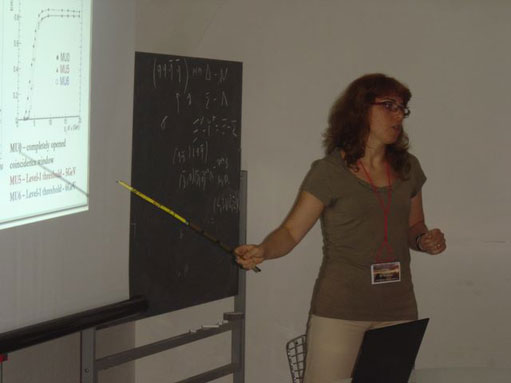
ATLAS e-News
23 February 2011
Junior seminars start up
4 May 2009

Natalia Panikashvili presents
A new seminar series aimed at ATLAS students and post-docs kicks off this week, on May 6th. The ATLAS Junior Seminars will provide an informal setting where young collaborators can hone their presenting skills, learn more about other areas of the experiment, make contacts with people at their level in other sub-groups, and ask questions without inhibition.
The people behind the scheme are Natalia Panikashvili and Else Lytken, who represent the young people of ATLAS on the Advisory Group to the Collaboration Board Chair.
"We have many short talks in ATLAS – status reports within working groups – but we don't have general seminars," explains Natalia.
It can be overwhelming for newcomers, trying to absorb huge amounts of information in order to get up-to-speed and make sense of these status updates. Junior Seminar speakers will address each subject starting from a more basic level – which everyone at ATLAS ought to be able to understand, regardless of their group or speciality – before going into more detail if they wish.
“In principle, much of this information is available in written form in the ATLAS documentation…” says Else. “But it’s not always realistic to digest it all. One of the main purposes of these seminars is the sharing of knowledge between the subgroups, to help juniors get a better overview of the experiment."
At one hour long in length, the seminars will offer chunks of relevant information in a more digestible format for newcomers, as well as having another big advantage over the ATLAS documentation: discussion. The opportunity to have a back-and-forth exchange with the speakers will enable the audience to thrash out the questions that are the most relevant to them. For this reason, Natalia and Else hope to keep the seminars very informal. In a meeting full of only experts, no-one wants to waste other peoples' time by asking things that may seem too basic or even irrelevant.
"We ask speakers to keep a high standard of presentation to make for catchy and interesting talks," says Natalia. "But at the same time speakers are not presumed to be the world's greatest expert. People from the floor will be welcome to contribute what they know.”
"The idea is that the seminars should be given by ATLAS juniors, but everybody wanting to learn about the subject is welcome to show up," adds Else.
The friendly, supportive atmosphere envisaged by Natalia and Else should be perfect for young people wanting to build their confidence as speakers, as well practice and prepare for future job interviews. The plan is to have a combination of technical and physics talks, but they should always address the question: 'What is the motivation for doing this work?'
The first talk, "Trying to find a low mass Higgs", will take place on May 6th at 5:00pm, and will be given by Jonas Strandberg in 40-S2-D01. To begin with, talks are scheduled every three weeks, but the frequency may increase depending on demand. To be kept informed about future seminars, sign up to the dedicated mailing list: atlas-juniors@cern.ch.

Ceri PerkinsATLAS e-News
|